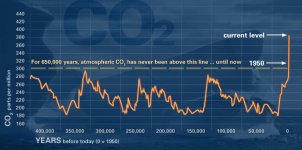http://www.sciencemag.org/content/306/5702/1686.full]The Scientific Consensus on Climate Change
The scientific consensus is clearly expressed in the reports of the Intergovernmental Panel on Climate Change (IPCC). Created in 1988 by the World Meteorological Organization and the United Nations Environmental Programme, IPCC's purpose is to evaluate the state of climate science as a basis for informed policy action, primarily on the basis of peer-reviewed and published scientific literature (3). In its most recent assessment, IPCC states unequivocally that the consensus of scientific opinion is that Earth's climate is being affected by human activities: 滴uman activities are modifying the concentration of atmospheric constituents that absorb or scatter radiant energy. [M]ost of the observed warming over the last 50 years is likely to have been due to the increase in greenhouse gas concentrations [p. 21 in (4)].
Others agree. The American Meteorological Society (6), the American Geophysical Union (7), and the American Association for the Advancement of Science (AAAS) all have issued statements in recent years concluding that the evidence for human modification of climate is compelling (8).
The 928 papers were divided into six categories: explicit endorsement of the consensus position, evaluation of impacts, mitigation proposals, methods, paleoclimate analysis, and rejection of the consensus position. Of all the papers, 75% fell into the first three categories, either explicitly or implicitly accepting the consensus view; 25% dealt with methods or paleoclimate, taking no position on current anthropogenic climate change. Remarkably, none of the papers disagreed with the consensus position.
http://www.scientificamerican.com/article.cfm?id=more-proof-of-global-warmMore-Proof of Global Warming
http://www.environment.nsw.gov.au/climatechange/evidence.htm - Evidence of climate change
http://www.ucsusa.org/ssi/climate-change/scientific-consensus-on.html - Union of Concerned Scientists
http://climate.nasa.gov/images/evidence_CO2.jpg
http://climate.nasa.gov/evidence/
Sea level rise
Global sea level rose about 17 centimeters (6.7 inches) in the last century. The rate in the last decade, however, is nearly double that of the last century.4
Global temperature rise
All three major global surface temperature reconstructions show that Earth has warmed since 1880. 5 Most of this warming has occurred since the 1970s, with the 20 warmest years having occurred since 1981 and with all 10 of the warmest years occurring in the past 12 years. 6 Even though the 2000s witnessed a solar output decline resulting in an unusually deep solar minimum in 2007-2009, surface temperatures continue to increase. 7
Warming oceans
The oceans have absorbed much of this increased heat, with the top 700 meters (about 2,300 feet) of ocean showing warming of 0.302 degrees Fahrenheit since 1969.8
Shrinking ice sheets
The Greenland and Antarctic ice sheets have decreased in mass. Data from NASA's Gravity Recovery and Climate Experiment show Greenland lost 150 to 250 cubic kilometers (36 to 60 cubic miles) of ice per year between 2002 and 2006, while Antarctica lost about 152 cubic kilometers (36 cubic miles) of ice between 2002 and 2005.
Declining Arctic sea ice
Both the extent and thickness of Arctic sea ice has declined rapidly over the last several decades. 9
Glacial retreat
Glaciers are retreating almost everywhere around the world — including in the Alps, Himalayas, Andes, Rockies, Alaska and Africa.10
Extreme events
The number of record high temperature events in the United States has been increasing, while the number of record low temperature events has been decreasing, since 1950. The U.S. has also witnessed increasing numbers of intense rainfall events.11
Ocean acidification
Since the beginning of the Industrial Revolution, the acidity of surface ocean waters has increased by about 30 percent.12,13 This increase is the result of humans emitting more carbon dioxide into the atmosphere and hence more being absorbed into the oceans. The amount of carbon dioxide absorbed by the upper layer of the oceans is increasing by about 2 billion tons per year.14,15
Don't worry - be happy.

